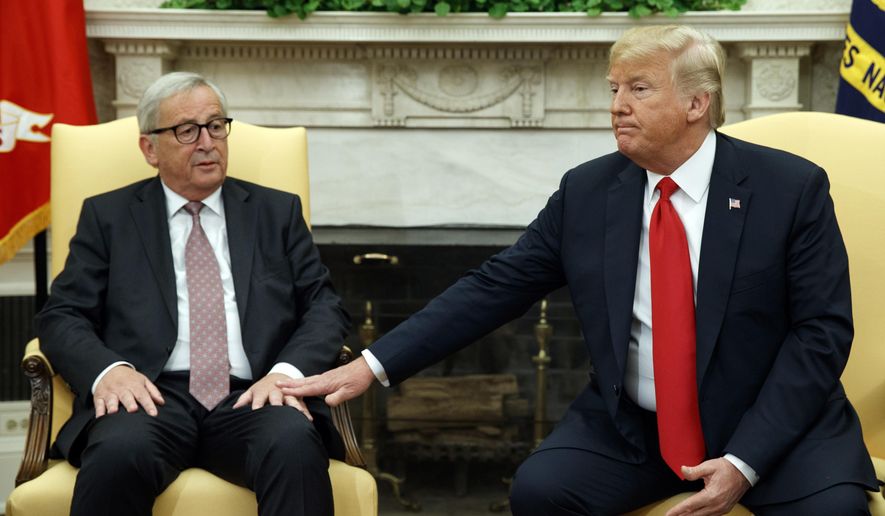Rampant fears of a trade war with Europe fizzled Wednesday when President Trump unexpectedly extracted a zero-tariff agreement from the European Union.
Mr. Trump and European Commission President Jean-Claude Juncker emerged from a White House meeting having backed away from a tit-for-tat tariff fight that threatened to punish automakers, farmers and consumers on both sides of the Atlantic.
They agreed to hammer out a deal to eliminate all tariffs and trade barriers and eliminate all subsidies on non-auto industrial goods, which closely mirrored the deal proffered by Mr. Trump.
“This was a very big day for free and fair trade,” Mr. Trump said while announcing the deal with Mr. Juncker at his side in the Rose Garden.
To avoid a tariff fight with the U.S., Mr. Juncker agreed that the EU would import more U.S. soybeans and liquified natural gas. The fuel agreement represents a major strategic move to reduce Europe’s reliance on Russian energy.
In another breakthrough, the EU joined the U.S. in pursuit of reforms at the World Trade Organization. Mr. Trump says WTO judges are tilted against the U.S.
The trade skirmish began when the Trump administration imposed tariffs on steel and aluminum. The administration said the move was for national security reasons and aimed to boost U.S. production of metals that have crucial military uses.
The EU retaliated with tariffs on $3.25 billion of American staples such as whiskey, motorcycles and peanut butter.
Mr. Trump and Mr. Juncker did not spell out how the deal would affect American steel and aluminum, but they said the agreement would seek zero tariffs in general.
Mr. Trump heralded the deal as a “new phase” in the U.S.-EU relationship, which he said included better cooperation on trade and global security.
“The United States and the European Union together count for more than 830 million citizens and more than 50 percent of the global GDP,” he said. “In other words, together we’re more than 50 percent of trade. If we team up, we can make our planet a better, more secure and more prosperous place.”
The deal sent a shot across the bow of China. The Trump administration is embroiled in tough trade negotiations with Beijing, and the prospect of a more unified U.S.-EU front strengthens Mr. Trump’s hand.
When the White House scheduled the impromptu event, anticipation of a deal sent stocks soaring. A last-minute rally lifted the Dow Jones industrial average to close up 172 points, or 0.68 percent. The index had been down 50 points early in the afternoon, partly because of trade war jitters.
Investors weren’t the only ones jazzed by the unexpected deal.
“This looks like an important truce called at the highest level,” said Edward Alden, a trade scholar at the Council on Foreign Relations. “It leaves many problems unresolved but launches a negotiating process to try to deal with them.”
Mr. Alden was most encouraged that the U.S. and EU agreed to work together to reform the WTO. “That is long overdue,” he said.
Sen. Lamar Alexander, a Tennessee Republican who introduced a bill earlier Wednesday that would delay Mr. Trump’s tariffs on European auto imports, applauded the zero-tariff development.
“The president has gotten the world’s attention with his tariffs, but what deserves more attention is his long-term solution — zero tariffs, zero barriers, which is, as the president said at the G-7 summit in June, ’the way it should be,’” Mr. Alexander said.
“Taking steps in the direction of reciprocity — insisting that other countries do for us what we do for them — rather than a trade war, will be much better for the American worker,” he said.
Iain Murray, a senior fellow at the Competitive Enterprise Institute, a libertarian think tank in Washington, said that “cooler heads appear to have prevailed.”
“Both sides made concessions today. However, this is far from the immediate reduction in all tariffs that the president requested this morning. This is the start of a process,” Mr. Murray said. “It therefore remains to be seen whether this is the beginning of the end of the global trade war or merely the end of the beginning.”
Mr. Juncker talked tough when the tariff fight started. He called Mr. Trump’s use of tariffs “stupid” and vowed to retaliate with steep tariffs on American goods.
But he came under intense pressure from automakers, especially in Germany, who were at the center of the dispute.
Long before EU officials entertained Mr. Trump’s offer for lower tariffs and barriers, German automakers floated the zero-tariff idea to end the feud with the U.S., which is their biggest customer.
“When I was invited by the president to the White House, I had one intention: I had the intention to make a deal today. And we made a deal today,” Mr. Juncker said in the Rose Garden.
For weeks, Mr. Trump railed against EU trade barriers to American goods and even called the EU a “foe” on trade.
The big dispute is over cars. The EU charges a 10 percent import duty on passenger cars, compared with the U.S. charge of 2.5 percent.
Mr. Trump, who insists he is trying to fix bad trade deals, has threatened to slap up to a 25 percent tariff on cars and car parts if the EU doesn’t level the playing field.
As he headed into the meeting, Mr. Trump shrugged off intense criticism from business leaders, farmers and Republican lawmakers that he was igniting a trade war that hurts the U.S. economy.
The president said he was fighting to get America a better deal after decades of trading partners taking advantage of U.S. policy.
“If we could have no tariffs and no barriers and no subsidies, the United States would be extremely pleased,” he said at the start of the Oval Office meeting with Mr. Juncker.
• S.A. Miller can be reached at smiller@washingtontimes.com.




Please read our comment policy before commenting.